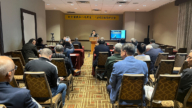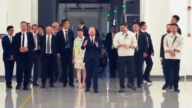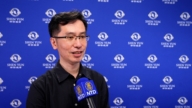【新唐人2013年12月21日訊】中共國務院官員週四說,部分國有企業,可能成為整體上市的公眾公司。但專家指出,中共所謂的「國有企業改革」仍以「公有制」為主體,跟三中全會所聲稱的「讓市場發揮更大作用」背道而馳。
國資委副主任黃淑和星期四在國務院新聞辦的發佈會上表示,國資委下一步將深化國有企業改革,加快國有企業「股權多元化改革」,發展所謂「混合所有制經濟」。
黃淑和表示,「國企混合所有制」主要採取四種形式。第一,涉及國家安全的少數國有企業,可以採用國有獨資形式。第二,涉及國民經濟命脈的重要行業、和關鍵領域的國有企業,可保持國有絕對控股。第三,涉及支柱產業、和高新技術產業等行業的重要國有企業,可保持國有相對控股。第四,國有資本不需要控制的國有企業,可採取國有參股形式。
「北京天則經濟研究所」所長助理段紹譯表示,當局如果希望提高生產效率,做好企業,創造更多的財富,就必須實行「私有化」。
北京天則經濟研究所所長助理段紹譯:「國有企業不可能做好的。都是花別人的錢辦別人的事。只有私有化,才能把這些企業做好。」
中共三中全會的《決定》文中,雖然提出要讓市場發揮更大作用,將市場的地位從「基礎性作用」提升為「決定性作用」,但是同時,中共仍強調以「公有制」為主體,繼續把「國家所有制」作為經濟的核心,並且要進一步增強「國有經濟的控制力和影響力」。
原中共中央體改委幹部曹思源:「國有企業的控制力是一種不平等的概念。國有企業跟私營企業,為甚麼就要國有企業去控制呢?恰恰相反,我認為在市場經濟當中,應該是平等的競爭,通過平等競爭,私營企業恰恰會佔主體地位,而不是用人為的規定,甚麼要控制,甚麼要主體地位。」
曹思源認為,國企改革的重點應該是放在改革國有制。國有制的比重要大大降低。比重降低的過程就是私有化的過程。但是從「國企混合所有制」的第一和第二形式來看,這次改革,不是朝著私有化的方向前進,而是大大加強了國有企業的比重。
而段紹譯則認為,加強國企地位的所謂改革,沒有任何意義,甚至有可能更糟糕。
段紹譯:「它強化了國有企業的地位,它要把國有企業要做大做強。相反就是他對民營企業是一種歧視。好比說,我們現在很多的國有企業,它都是虧本的。因為它的土地是國家劃撥的,它的錢也是原來國家投資的,它的銀行貸款利息是很低的,在這種情況下,它們都幾乎不怎麼賺錢。」
而同一類型的民營企業跟國有企業相比,要承擔更高的成本。比方說,購買土地的錢,或通過民間融資的高利息成本。段紹譯指出,國有企業如果按私人企業那樣的成本來衡量的話,沒有幾個企業是賺錢的。
段紹譯表示,一個企業有沒有必要存在,只有市場知道。市場需要,就應該存在,市場不需要,就不應該存在。而企業能賺錢就證明市場需要,不賺錢就是不需要。
段紹譯認為,「國企私有化」面臨的阻力,首先是左派思想的影響。中共建政之初就是號稱要建立一個「公有制」的國家。
段紹譯:「好像說私有化就已經背離了他們的目地。他們打倒國民黨,把這麼多私營企業沒收了。他們的目地就是搞公有制。如果現在又搞私有化,他們好像是自己打自己的嘴巴。他們心裡上邁不出這個坎。」
其次,中共認為,實行「私有化」會削弱共產黨的統治。
另外,還有利益集團的阻礙。這些利益集團就是國有企業的實際控制人。雖然國有企業名義上是全民所有,實際上是國資委領導所有,以及企業的董事長、總經理所有。
採訪編輯/秦雪 後製/黎安安
New Reform of State Owned Enterprises
A Chinese Communist Party (CCP) State Council official
said on Thursday that some state owned enterprises (SOE)
will likely become overall market public companies.
But experts say the CCP’s so called SOE reform is
still with public ownership as the mainstay.
This is against"letting the market play a bigger role"
mentioned in the Third Plenum.
SASAC Deputy Director Huang Shuhe indicated at a press
conference of the State Council on Thursday that SASAC
will strengthen the SOE reform, speed the reform of “equity
diversification",and develop a “mixed ownership economy".
Huang Shuhe indicated that “SOE mixed ownership”
mainly takes four forms.
First, a few SOE involving national security
can be state-owned.
Second, major industries involving national lifelines
Can be maintained under the state’s absolute control.
Third, SOE pillar industries and high-tech industries
can remain the state’s relative holdings.
Fourth, SOE that don’t have state’s holdings
can use the form of state-owned shares.
The Unirule Institude of Economy assistant director
Duan Shaoyi says if the authority wants to increase
the productivity, run the company well, and make
more money, it must implement privatization.
Duan Shaoyi:"SOE’s can’t do it well, because they spend
other people’s money to run other people’s businesses.
Only privatization can run the business well."
The decision document of the CCP’s Third Plenum says
to let the market play a more important role, and upgrade
the market from fundamental role to decisive role.
But the CCP still emphasizes keeping"public ownership" to
be the main body, to keep"state ownership"the economy core,
and to improve the control and influence of the state economy.
Cao Siyuan, former Cadres of the CCP Central Commission
for Restructuring:"SOE’s control force is not fair.
There are SOE and private enterprises. Why does SOE
control the market? On the contrary, I think the competition
in the economy market should be equal.
Through equal competition, private enterprises will
become the main body. It should not be ruled by man.
Why does the government control?"
Cao believes that SOE reform should
focus on reforming state ownership.
The proportion of state ownership must be lowered a lot.
Lowering the proportion of SOE is a process of privatization.
The first two forms of"mixed ownership"reform is not
towards privatization but to strengthen the proportion of SOE.
Duan Shaoyi thinks that it’s meaningless to strengthen
SOE’s status, which makes the situation even worse.
Duan: “It reinforces SOE’s status, making SOE stronger.
It’s a discrimination to private enterprises.
For example, we have a lot of SOE that are losing money.
Because its land is given by the nation, it’s money is
investigated by the nation.it’s bank mortgage is very low.
In this situation, it still doesn’t make much money."
On the contrary, the same size and type of private enterprise
have to suffer more costs.
For example, private enterprises pay more money for land
and higher interest.
Duan says if SOE is evaluated the same way,
there are not many SOE that earn money.
Duan indicates that only the market knows if a company
should still exist or not.
If the market needs it, it should exist,
if the market doesn’t need it, it should exist.
Whether a company earns money or not
can verify if the market needs the company or not.
Duan thinks that privatization of SOE faces
obstacles from leftists ideology.
The CCP established a nation of
public ownership at the beginning.
Duan:"It seems that privatization is against the CCP’s goal.
The CCP fight over the Nationalist Party and took over many
private enterprises.
Their purpose is to make public ownership.If they now start
privatization again,it’s like fighting against itself.
They can’t get over such a conflict."
Second, the CCP thinks having privatization
weakens the rule of the Communist Party.
Also, there are obstacles from interest groups. Those interest
groups are the people who control the SOE.
Although SOE is nominally owned by people, in fact,ithey are
owned by the leadership of State Owned Assets Supervision
and Administration Commission,and the chairman and general
manager of the SOE.
Interview & Edit/Qin Xue Post-Production/Li Anan

























